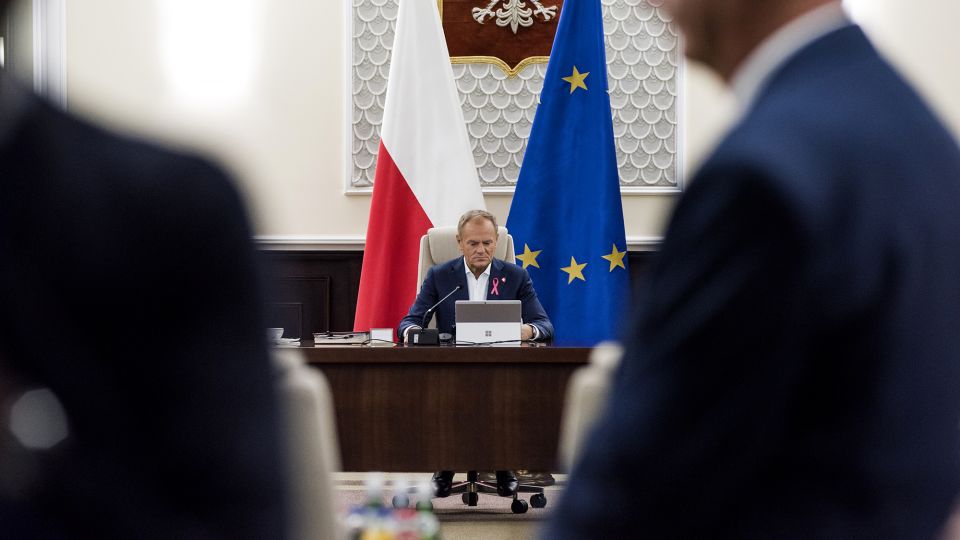German police check people arriving from France at the German-French border last month. Scholz introduced checks at frontiers with France, Luxembourg, the Netherlands, Belgium and Denmark last month, adding to similar measures it had on its eastern flank. – Thomas Niedermueller/Getty Images
Its architect, Italy’s right-wing leader Giorgia Meloni, was expected to be something of an outcast on the European stage when she took office two years ago. Now, more and more leaders are sounding more and more like Meloni.
European arrivals are in fact coming down; there have been around 140,000 this year, compared to a seven-year high of around 275,000 last year.
But instability and displacement in the Middle East, the success of populist parties in virtually every part of the continent this year and a number of violent attacks allegedly committed by migrants – which have been quickly pounced upon by right-wing politicians, sometimes aided by a flow of misinformation – mean that the potency of the topic is only mounting.
It has left migrant rights groups increasingly isolated. The International Rescue Committee called the opening of Italy’s offshore centers a “dark day for the EU’s asylum and migration policies” and said it hoped that the protocol would not be a blueprint for others. “Keeping people trapped behind barbed wire, deliberately out of sight and out of mind, is not a sustainable solution to Europe’s migration challenges,” IRC’s EU advocacy director, Marta Welander, said in a statement to CNN on Tuesday.
Scholz looks on enviably as the far-right surges
Still, if Europe is heading in the same direction on illegal migration, it remains disunited.
A long-awaited new EU migration pact, aimed at sharing the burden of processing asylum claims more evenly across the bloc, has been picked apart from various angles by the 27 leaders. Some want it implemented sooner; others, including Tusk, have said they won’t accept relocated asylum seekers.
There is an evergreen issue at the heart of Europe’s latest divide; it is made up of 27 leaders who each have their own, domestic audiences at the front of their minds. But all of them have learned by now that public anger towards increasing legal and illegal migration is an indelible political force.
In Poland, Tusk is attempting to bend it towards his will. The veteran of centrist politics has banked some credit with voters one year after his election victory, but the populist Law and Justice (PiS) party he ousted last October remains a dangerous force, and its attacks on Tusk are primarily two-pronged: that he is a stooge of Brussels, and weak on the border.
There are caveats to Tusk’s plan. It is more targeted towards the Belarus border crisis than the initial language suggested; it is not immediate and its path to becoming law is tenuous. It is not entirely new – Finland has pursued a similar plan this year – and it is an escalation of, not a break with, Tusk’s stance on border security, which has always centered on efforts to repel the massing crowds in Belarus.
But tellingly, most of those details were missing from the prime minister’s initial announcement. “Tusk amplified the message (on asylum) on purpose to get attention,” Kucharczyk said. “The migration and security narrative was something that PiS has been using very successfully over the years; now Tusk has stolen it from them, and turned it against them.”
Tusk will hope this gambit sets the table for May’s election to succeed Poland’s PiS-aligned, veto-happy president – a contest that is absolutely pivotal to the government’s legislative hopes. “It’s an existential issue for this coalition, and they don’t want to take chances on issues like migration,” Kucharczyk said.
Scholz may be looking on enviably. Tusk has staked out a hardline position on the border before the issue tanks his popularity, but for the German leader, it may already be too late.
Scholz, whose SPD party is on course to lose power next year, has been slow to react to public anger, ignited most recently by a fatal stabbing in the western city of Solingen. The suspect was identified as a 26-year-old Syrian man with alleged links to ISIS, who had been due for deportation.
Days later, the AfD scored the first far-right state election victory in the country since the Nazi era – a breakthrough that spooked Europe.
That context informed Scholz’s sudden move to introduce checks at Germany’s western borders, in addition to checks that had already existed on its eastern flank. Hungary and Slovakia have made similar moves.
The wider question is whether the longstanding principles of the border-free Schengen Area can survive an enduring era of rising migration and populist subversion.
Its answer may depend, in part, on how successfully Europe’s current crop of centrists can take the fight on migration to their populist rivals – and whether they can maintain a reputation for moderation while doing so.
On that, Tusk seems willing to chart the course. But from the left, there are risks. “Tusk’s voters may applaud the security dimension (of his asylum plan),” Kucharczyk said. “But they will also want to see how (he) is different from the hard right.”
CNN’s Barbie Latza Nadeau contributed reporting.
For more CNN news and newsletters create an account at CNN.com
Source link : http://www.bing.com/news/apiclick.aspx?ref=FexRss&aid=&tid=6714897992be4e93b5ca713408c2f979&url=https%3A%2F%2Fnz.news.yahoo.com%2Feurope-centrists-flocking-migration-may-040048082.html&c=16268302576292787610&mkt=de-de
Author :
Publish date : 2024-10-19 17:00:00
Copyright for syndicated content belongs to the linked Source.
